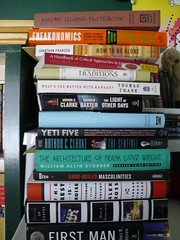How do you define “teacher quality”?
November 7, 2011
 Today I’ve read two articles that make me curious about the way “teacher quality” is being defined and measured these days.
Today I’ve read two articles that make me curious about the way “teacher quality” is being defined and measured these days.
First, I read a New York Times article about a school in Tennessee where the principal is so busy with paperwork and unnecessary observations that he’s lost touch with many of the things happening in the school. The title of the article neatly summarizes their feeling for the way that Race to the Top has led to a redefinition of “teacher quality” at their school: In Tennessee, Following the Rules for Evaluations Off a Cliff.
Then, I read Six Questions for Better Professional Development on the Edutopia Deeper Learning Blog Carnival, and wondered about how different the assumptions about “teacher quality” were compared to those in the Times article. The author talks about quality teaching (and professional development) as collaborative, organic, and reflective. It involves “cultivating a healthy professional community,” and that school in Tennessee seems to be on a track where they are able to do anything BUT support professional growth and “teacher quality.”
Maybe it can be partially attributed to the language that’s used, but the Edutopia blog seems to posit “teacher quality” as something that you nurture and encourage while the the Times article seems to describe a scenario where “teacher quality” is something you have to badger people into developing or revealing.
I understand the desire and need for ways to measure “teacher quality.” I’m just not sure of the right way to go about it. How do you think “teacher quality” should be defined? I’d love to hear some real teachers talking about the issue.
Cross-posted as a Discussion Question in the Verizon Thinkfinity 101 Community on the Thinkfinity Community site.


